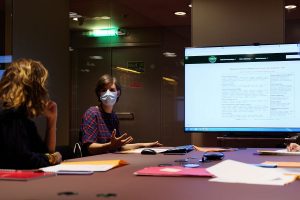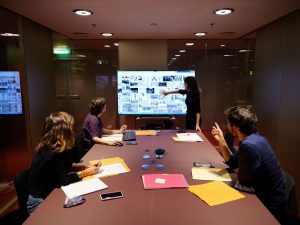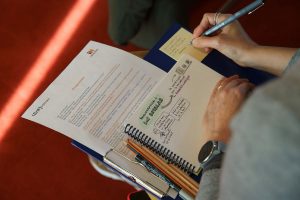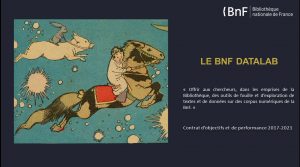An evolving context
As more and more data and digital collections are available in libraries, the expected role of such libraries in the digital humanities field is becoming a key issue. “Providing access to collections for a wide audience” (as defined by the French law for Bibliothèque nationale de France, or BnF) is in fact one of the core missions of a national library. But such a goal cannot be reached nowadays without providing, not only access to digital material, but also support and assistance to understand and work on digital collections and/or data.
With the availability of new massive digital collections, new ways of exploring data started to emerge, along with new requests from academic community. Those new uses challenged BnF to rethink all the services offered around such collections. As librarians, we all know that giving access is not enough. We needed to build a strong service allowing global support, not only from a simple technical point of view, but also on collection expertise, research in residence, project monitoring and so on.
© Élie Ludwig
A place to meet and learn
To welcome researchers and create interaction between experts, we needed an identified location. We also had to take into account that part of the digital collections, especially web archives, are only accessible inside the premises and that some of our researchers are both in demand of work spaces and expert support: this is why our new lab, called BnF DataLab, is located within the research library.
© Élie Ludwig
Building a research path
We also had to create a service catalogue which could cover widely the lifecycle of project, as follows:
- Step 1: Welcoming and orientating the researcher. Our catalogues and collections are complex, as a result of a long history. They can be searched in various ways and often require a cross-referenced search. This first step allows to centralize requests, give a first piece of advice, and set up an appointment with BnF experts.
- Step 2: Building corpora by offering assistance, help with the bibliographic tools, help with the application programming interface (API) and extraction tools, training on formats…
- Step 3: Working on the corpora, with a dedicated IT infrastructure (servers, storage, virtual machines, software tool box), desk and assistance
- Step 4: Creating a community around BnF DataLab. A main purpose of BnF DataLab deals with interaction, transfer skills and competences. By organizing trainings, workshops and symposiums, our purpose is to create a place where different experts, from different fields (librarians, researchers, engineers) can communicate and learn from each other and develop useful tools for all communities.
© Emmanuel Nguyen Ngoc / BnF
This physical location has its virtual equivalent. Onsite, a digital portal allows access to copyright documents, while remotely a web site explains the API uses.
BnF Datalab is more than just an information desk or a service offer, it was imagined as a laboratory, a place of interaction and training among peers, a place allowing experiments and R&D thanks to dedicated partnerships such as Huma-num (a multi-institution academic initiative in the digital humanities filed) and the help of in-residence research teams. Therefore, the tools developed within the framework of research programs or call for projects will be kept in a kind of “toolbox” reusable for other projects.
BnF DataLab prefigures a new generation of library services, which combines onsite and remote services, hosts mixed practices and activities, and is dedicated to exploring digital resources and to producing new knowledge and tools.
Marie Carlin, BnF DataLab coordinator: marie.carlin@bnf.fr
Arnaud Laborderie, Gallica coordinator for research data mining: arnaud.laborderie@bnf.fr
Further reading:
- Dedicated article in “Humanités numériques” via OpenEdition Journals (in French, English summary): https://journals.openedition.org/revuehn/2684?lang=fr or via HAL: https://hal.archives-ouvertes.fr/hal-03285816/ (idem)
- BnF DataLab institutional page (in French): https://www.bnf.fr/fr/bnf-datalab: https://www.bnf.fr/fr/bnf-datalab
- Launch of BnF DataLab in October 2021 (in French): https://bnf.hypotheses.org/10643
- BnF DataLab 2021 call for projects (in French): https://www.bnf.fr/fr/actualites/bnf-data-lab-appel-projets-2021
- The Huma-num partnership (in French): https://www.huma-num.fr/



